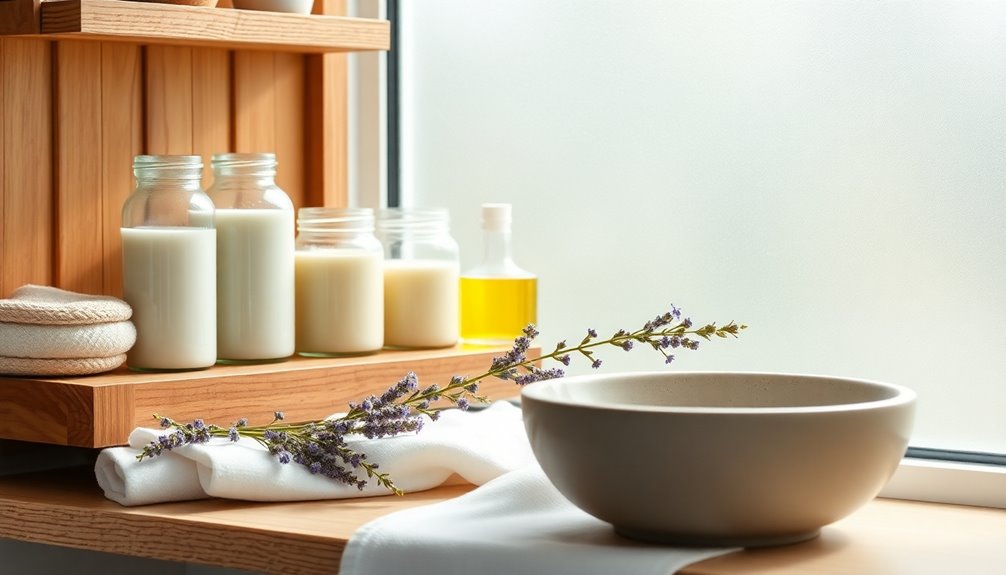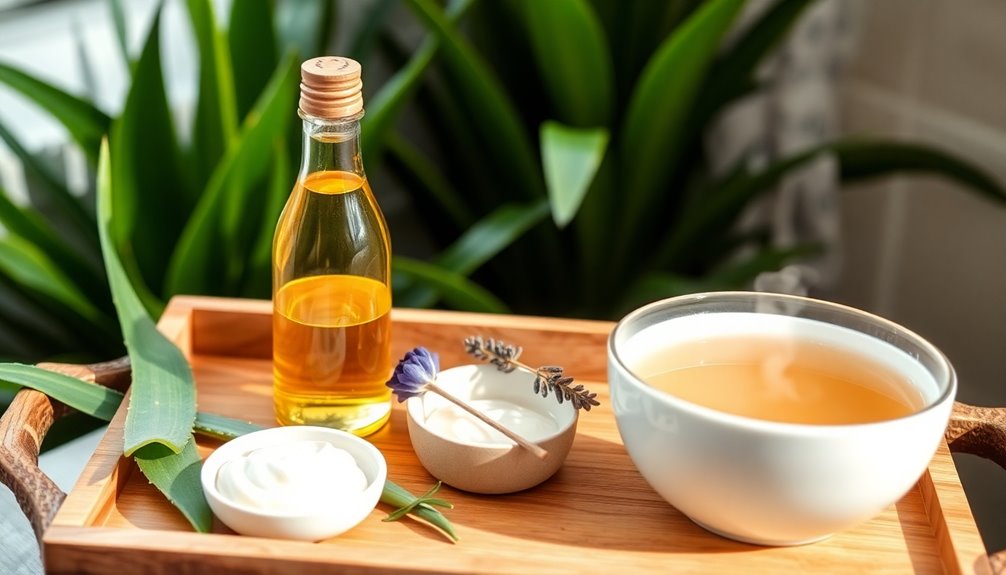Caring for sensitive skin naturally means being gentle and mindful. Start by identifying your skin triggers; keep a diary of reactions to products, foods, and environmental factors. Use mild, fragrance-free cleansers that are hypoallergenic, and cleanse with lukewarm water to avoid irritation. Incorporate natural moisturizers like aloe vera and coconut oil to hydrate and soothe. Utilize soothing ingredients such as chamomile and colloidal oatmeal to calm inflammation. Lastly, maintain a balanced diet rich in fruits, vegetables, and healthy fats to support your skin from the inside out. If you want more tips and insights, there's plenty more to discover.
Key Takeaways
- Keep a detailed diary to identify and avoid skin triggers, including products, foods, and environmental factors that may cause irritation.
- Choose mild, fragrance-free cleansers and use lukewarm water to avoid stripping your skin's natural oils.
- Incorporate natural moisturizers like coconut oil and aloe vera to provide hydration and soothe sensitive skin.
- Use soothing ingredients such as chamomile and colloidal oatmeal to reduce redness and calm irritation effectively.
- Maintain a balanced diet rich in fruits, vegetables, and healthy fats to support skin health and reduce inflammation.
Identify Your Skin Triggers

To effectively care for your sensitive skin, start by identifying your skin triggers. These triggers can vary from person to person, so it's essential to pay attention to your body's reactions.
Begin by keeping a detailed diary of your skin's behavior. Note what products you use, the foods you eat, and any environmental factors that might affect your skin. Using a gentle waterproof makeup remover can also help prevent additional irritation during your cleansing routine.
You might discover that certain ingredients in skincare products cause irritation or redness. Common culprits include fragrances, alcohol, and harsh exfoliants. If you notice a pattern, consider switching to gentler alternatives.
Also, pay attention to your diet; some people find that dairy, gluten, or certain additives lead to breakouts or irritation.
Environmental factors can also play a significant role. Changes in weather, pollution, or exposure to allergens may aggravate your skin.
Try to limit your exposure to these elements and observe how your skin responds. By identifying these triggers, you can take proactive steps to avoid them, ultimately helping your skin feel calmer and more balanced. Additionally, using a suitable body lotion for your skin type can enhance your skincare routine and provide the necessary hydration your sensitive skin craves.
Choose Gentle Cleansing Methods
After identifying your skin triggers, it's time to focus on how you cleanse your skin. Choosing gentle cleansing methods is crucial for maintaining your skin's health and comfort.
Start by selecting a mild, fragrance-free cleanser that won't irritate your sensitive skin. Look for products labeled as "hypoallergenic" or "dermatologist-tested" to ensure they're suitable for your needs. Incorporating hyaluronic acid into your skincare routine can also help to hydrate and soothe sensitive skin.
When you wash your face, use lukewarm water instead of hot, as hot water can strip your skin of its natural oils and lead to dryness. Apply the cleanser using your fingertips, gently massaging it in a circular motion.
Avoid scrubbing or using abrasive washcloths, as these can cause irritation. Rinse thoroughly, making sure to remove all cleanser residue.
If you wear makeup, consider using a gentle cleansing oil or micellar water first to remove it before your regular cleanse. Remember to cleanse your skin only twice a day—once in the morning and once at night—to prevent over-washing, which can exacerbate sensitivity. Additionally, using micellar water can help to effectively remove makeup while soothing sensitive skin.
Incorporate Natural Moisturizers

In the quest for soothing sensitive skin, incorporating natural moisturizers can make all the difference. Unlike synthetic products, natural moisturizers often contain fewer irritants and more beneficial properties. By choosing the right ones, you can effectively hydrate your skin without causing flare-ups.
Here are some fantastic natural moisturizers to consider:
- Coconut Oil: Known for its deep moisturizing properties, it also has antibacterial qualities.
- Aloe Vera: This soothing gel hydrates and calms irritation, perfect for sensitive skin.
- Shea Butter: Rich in vitamins, it deeply nourishes and protects your skin barrier.
- Jojoba Oil: Mimicking your skin's natural oils, it balances moisture without clogging pores.
When applying these moisturizers, always do so on damp skin to lock in hydration. Gently massage a small amount into your face and body, ensuring even coverage.
It's essential to patch-test any new product to avoid potential reactions. By incorporating these natural options into your routine, you'll create a protective barrier that helps keep your sensitive skin calm and well-hydrated. Additionally, using coconut oil moisturizers can enhance your skin's hydration while providing added antibacterial benefits.
Use Soothing Ingredients
When you're caring for sensitive skin, using soothing ingredients can significantly reduce irritation and promote healing. Opt for natural substances like aloe vera, which hydrates and calms redness. Its gel-like texture feels refreshing and can help ease inflammation.
Chamomile is another excellent choice; it contains antioxidants that soothe and protect your skin. You might also consider using calendula oil, known for its anti-inflammatory properties. It can help alleviate discomfort and support your skin's natural healing processes.
Oatmeal is a great option too; colloidal oatmeal can relieve itchiness and create a protective barrier on your skin. Additionally, look for products with green tea extract, which offers anti-inflammatory benefits and helps reduce irritation.
Lavender essential oil can be calming as well, not just for your skin but also for your mind. Remember to patch-test any new ingredient to ensure it works well with your skin.
Using these soothing ingredients regularly can create a calming routine that diminishes sensitivity over time. With the right choices, you can keep your sensitive skin happy and healthy.
Maintain a Balanced Diet

A balanced diet plays a crucial role in maintaining healthy, sensitive skin. What you eat directly impacts your skin's condition, so it's essential to fuel your body with nutrient-rich foods.
By focusing on whole foods, you can help reduce inflammation and promote a clearer complexion. Here are some key components to include in your diet:
- Fruits and Vegetables: Packed with antioxidants and vitamins, they help fight free radicals and support skin repair.
- Healthy Fats: Foods like avocados, nuts, and fatty fish provide essential fatty acids that keep your skin hydrated and supple.
- Whole Grains: Opt for whole grains over refined ones; they stabilize blood sugar levels and reduce skin sensitivity.
- Hydration: Don't forget to drink plenty of water! Staying hydrated helps maintain your skin's elasticity and prevents dryness.
Frequently Asked Questions
Can I Use Essential Oils on Sensitive Skin?
You can use essential oils on sensitive skin, but you should dilute them with a carrier oil first. Always perform a patch test to ensure you don't have an adverse reaction to the oil.
How Often Should I Exfoliate Sensitive Skin?
Think of your skin as a delicate flower; you wouldn't want to overwater it. Exfoliate sensitive skin once a week, gently removing dead cells without causing irritation. Less is often more when it comes to care!
Are There Specific Fabrics That Irritate Sensitive Skin?
Yes, certain fabrics can irritate your sensitive skin. You should avoid rough materials like wool and synthetic fibers. Instead, opt for soft, breathable fabrics such as cotton and bamboo to reduce irritation and enhance comfort.
What Are the Best Sun Protection Methods for Sensitive Skin?
For sensitive skin, you should choose mineral-based sunscreens with zinc oxide or titanium dioxide. Always apply generously, reapply every two hours, and wear protective clothing and hats for additional coverage against harmful UV rays.
Can Stress Affect My Sensitive Skin Condition?
Studies show over 30% of people with sensitive skin report flare-ups due to stress. Yes, stress can worsen your condition, triggering inflammation and irritation. Managing stress through relaxation techniques can help improve your skin's health.
Conclusion
By tuning into your skin's needs and embracing nature's gentle touch, you can create a soothing sanctuary for your delicate complexion. Picture soft, calming lotions gliding on like a whisper, and the refreshing burst of a vibrant salad nourishing you from within. As you cultivate these mindful habits, your skin will radiate health and vitality, reflecting the care you've invested. Remember, every small step you take brings you closer to that serene glow you've always dreamed of.




